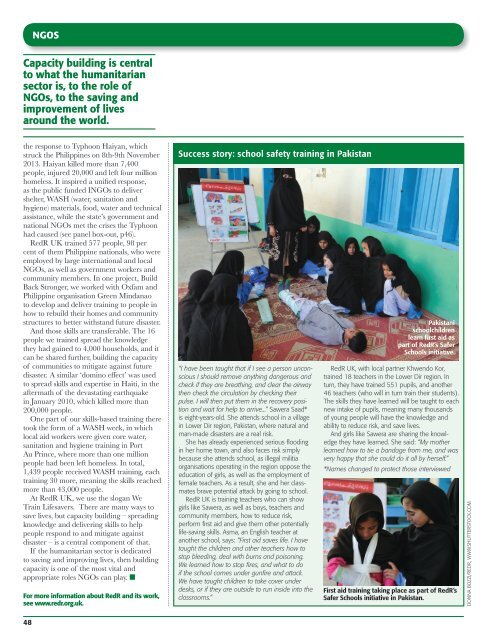SOURCE: Sustainable Development
SOURCE Sustainable Development magazine will be exploring the post 2015 international development landscape. It will engage the private sector to drive innovation and support the ever growing need to achieve the UN Sustainable Development goal’s
SOURCE Sustainable Development magazine
will be exploring the post 2015 international
development landscape.
It will engage the private sector to drive
innovation and support the ever growing
need to achieve the UN Sustainable
Development goal’s
Create successful ePaper yourself
Turn your PDF publications into a flip-book with our unique Google optimized e-Paper software.
NGOS<br />
Capacity building is central<br />
to what the humanitarian<br />
sector is, to the role of<br />
NGOs, to the saving and<br />
improvement of lives<br />
around the world.<br />
the response to Typhoon Haiyan, which<br />
struck the Philippines on 8th-9th November<br />
2013. Haiyan killed more than 7,400<br />
people, injured 20,000 and left four million<br />
homeless. It inspired a unified response,<br />
as the public funded INGOs to deliver<br />
shelter, WASH (water, sanitation and<br />
hygiene) materials, food, water and technical<br />
assistance, while the state’s government and<br />
national NGOs met the crises the Typhoon<br />
had caused (see panel box-out, p46).<br />
RedR UK trained 577 people, 98 per<br />
cent of them Philippine nationals, who were<br />
employed by large international and local<br />
NGOs, as well as government workers and<br />
community members. In one project, Build<br />
Back Stronger, we worked with Oxfam and<br />
Philippine organisation Green Mindanao<br />
to develop and deliver training to people in<br />
how to rebuild their homes and community<br />
structures to better withstand future disaster.<br />
And those skills are transferable. The 16<br />
people we trained spread the knowledge<br />
they had gained to 4,000 households, and it<br />
can be shared further, building the capacity<br />
of communities to mitigate against future<br />
disaster. A similar ‘domino effect’ was used<br />
to spread skills and expertise in Haiti, in the<br />
aftermath of the devastating earthquake<br />
in January 2010, which killed more than<br />
200,000 people.<br />
One part of our skills-based training there<br />
took the form of a WASH week, in which<br />
local aid workers were given core water,<br />
sanitation and hygiene training in Port<br />
Au Prince, where more than one million<br />
people had been left homeless. In total,<br />
1,439 people received WASH training, each<br />
training 30 more, meaning the skills reached<br />
more than 43,000 people.<br />
At RedR UK, we use the slogan We<br />
Train Lifesavers. There are many ways to<br />
save lives, but capacity building – spreading<br />
knowledge and delivering skills to help<br />
people respond to and mitigate against<br />
disaster – is a central component of that.<br />
If the humanitarian sector is dedicated<br />
to saving and improving lives, then building<br />
capacity is one of the most vital and<br />
appropriate roles NGOs can play. ■<br />
For more information about RedR and its work,<br />
see www.redr.org.uk.<br />
Success story: school safety training in Pakistan<br />
“I have been taught that if I see a person unconscious<br />
I should remove anything dangerous and<br />
check if they are breathing, and clear the airway<br />
then check the circulation by checking their<br />
pulse. I will then put them in the recovery position<br />
and wait for help to arrive...” Sawera Saad*<br />
is eight-years-old. She attends school in a village<br />
in Lower Dir region, Pakistan, where natural and<br />
man-made disasters are a real risk.<br />
She has already experienced serious flooding<br />
in her home town, and also faces risk simply<br />
because she attends school, as illegal militia<br />
organisations operating in the region oppose the<br />
education of girls, as well as the employment of<br />
female teachers. As a result, she and her classmates<br />
brave potential attack by going to school.<br />
RedR UK is training teachers who can show<br />
girls like Sawera, as well as boys, teachers and<br />
community members, how to reduce risk,<br />
perform first aid and give them other potentially<br />
life-saving skills. Asma, an English teacher at<br />
another school, says: “First aid saves life. I have<br />
taught the children and other teachers how to<br />
stop bleeding, deal with burns and poisoning.<br />
We learned how to stop fires, and what to do<br />
if the school comes under gunfire and attack.<br />
We have taught children to take cover under<br />
desks, or if they are outside to run inside into the<br />
classrooms.”<br />
Pakistani<br />
schoolchildren<br />
learn first aid as<br />
part of RedR’s Safer<br />
Schools initiative.<br />
RedR UK, with local partner Khwendo Kor,<br />
trained 18 teachers in the Lower Dir region. In<br />
turn, they have trained 551 pupils, and another<br />
46 teachers (who will in turn train their students).<br />
The skills they have learned will be taught to each<br />
new intake of pupils, meaning many thousands<br />
of young people will have the knowledge and<br />
ability to reduce risk, and save lives.<br />
And girls like Sawera are sharing the knowledge<br />
they have learned. She said: “My mother<br />
learned how to tie a bandage from me, and was<br />
very happy that she could do it all by herself.”<br />
*Names changed to protect those interviewed<br />
First aid training taking place as part of RedR’s<br />
Safer Schools initiative in Pakistan.<br />
DONNA BOZZI/REDR, WWW.SHUTTERSTOCK.COM<br />
48<br />
SSD_NGO_capacity_building.indd 48 04/03/2015 14:00<br />
Buty
















